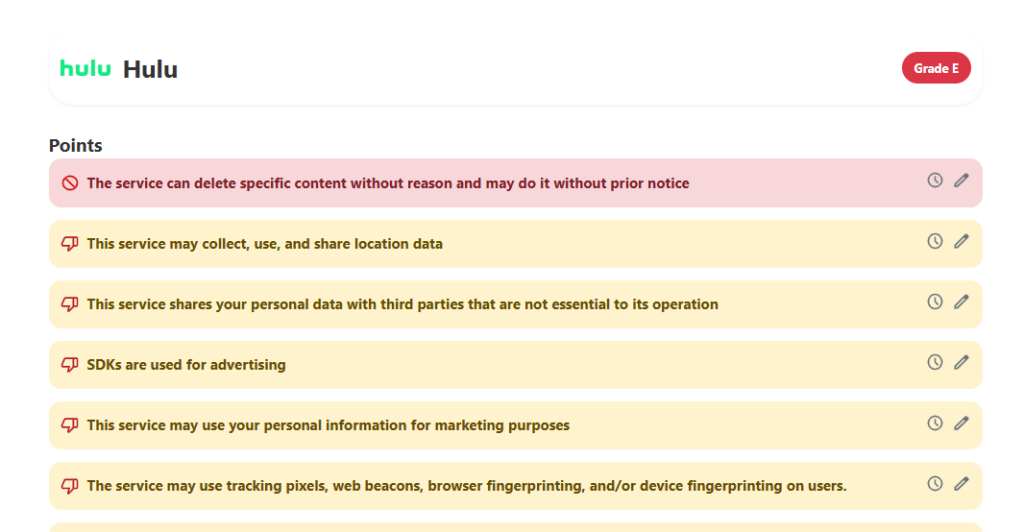Is Hulu Safe?
Laura Martisiute
Reading time: 5 minutes

Table of Contents
If you use or plan to use Hulu, you need to know: Is Hulu safe?
Below, we explain whether Hulu is:
- Safe to use.
- Good for privacy.
We also look at some steps you can take to improve both your safety and privacy when using this online service.
What Is Hulu?
Hulu is a streaming service through which subscribers can watch TV shows, movies, documentaries, and original content. It offers content from major networks, studios, and independent creators.

Hulu + Live TV lets subscribers stream live TV channels, including sports, news, and entertainment.
Hulu has a variety of subscription plans, including an ad-supported plan at a lower price (viewers can watch content with occasional commercial breaks) and an ad-free option for a higher cost.
Is Hulu Safe?
Yes, Hulu is generally considered safe.
It’s a legitimate service owned by Disney Streaming and has been a trusted streaming platform for over a decade (it was launched in 2007).
In its privacy policy, Hulu says it uses “physical, technical, and administrative measures” to protect subscriber information from unauthorized use, disclosure, modifications, and loss and theft, which is fairly standard.
Plus, it says it uses measures like encryption and hashing to keep your sensitive information safe when it’s in transmission.

Hulu also provides two-factor authentication.
In terms of content, Hulu is considered a safe platform for families.
Its parental controls allow subscribers to create ‘Kids Profiles,’ which show content suitable for all ages. Parents can also enable ‘PIN Protection’ to access non-Kids Profiles.
There have been no confirmed data breaches associated with Hulu at the time of writing. However, several years ago, a number of Hulu subscribers were discussing a potentially undisclosed security incident that affected their accounts.
Is Hulu Private?
Depends on your definition of “private.”
Hulu takes standard precautions to protect user privacy, but like many streaming services, it collects certain data for operational and advertising purposes.
When you use Hulu, the platform gathers information you give it directly, like your name, email address, and payment details, as well as information it collects through your use of its services, like your precise location, show titles and episode names, and page views, according to its privacy policy.

It also gets data about you from cookies and other similar technologies, third-party services, and data aggregators.
For users concerned about privacy, Hulu provides some control over data sharing. You can adjust your privacy settings to limit the kinds of personalized ads you’re shown, opt out from precise location data collection on mobile, and decline consent to Hulu sharing your viewing data and personal information with their content programmers.
In 2011, a class action lawsuit was filed against Hulu for allegedly violating the Video Privacy Protection Act (VPPA).
The dispute involved Hulu’s use of Facebook “Like” buttons, which sent both the video’s unique URL and the user’s Facebook ID to Facebook, even if the user didn’t interact with the button.
A California court ruled in favor of Hulu, granting summary judgment and determining that plaintiffs could not prove Hulu intentionally disclosed users’ video preferences in violation of the VPPA.
Hulu’s privacy policy gets a “Grade E” from Terms of Service; Didn’t Read (ToS;DR), a project that rates internet services’ terms of service and privacy policies. The grade means “The terms of service raise very serious concerns.”

Among the concerns listed by ToS;DR is that Hulu may collect, use, and share location data; SDKs are used for advertising; it shares user data with third parties that aren’t essential for its operation; and the service reserves the right to disclose personal information without informing users.
The Common Sense Privacy Program, which evaluates internet services’ with kids’ privacy and security in mind, gives Hulu a score of 63% out of 100%, which is a “Warning.”
How to Improve Your Safety and Privacy On Hulu
Follow the below steps for a safer and more private experience while streaming content on Hulu.
- Limit personalized ads. You can adjust your ad preferences in your account settings.
- Review and adjust privacy settings. Hulu lets you control what data is shared and used for personalization.
- Use a VPN for streaming. A virtual private network (VPN) can hide your real IP address, which makes it harder for Hulu and third-party advertisers to track your location and activity.
- Turn on two-factor authentication (2FA). By turning on 2FA in your Hulu account, you add an extra layer of security, ensuring that only you can access your account and settings.
- Regularly review your viewing history. This can help you spot any suspicious activity quickly. Specifically, keep an eye out for any unusual login attempts or access from unfamiliar locations through the “Manage Devices” section in your account settings.
- Make an opt-out request. If you’re a California resident, you can make specific privacy requests. For example, you can request to see what information Hulu has disclosed to third parties for their direct marketing purposes in the preceding calendar year by writing to Attention: Legal Department, Hulu, LLC, 2500 Broadway, 2nd Floor, Santa Monica, CA 90404.
- Be wary of phishing attempts. Never provide your Hulu login credentials via email or phone.
Our privacy advisors:
- Continuously find and remove your sensitive data online
- Stop companies from selling your data – all year long
- Have removed 35M+ records
of personal data from the web
Save 10% on any individual and
family privacy plan
with code: BLOG10
news?
Don’t have the time?
DeleteMe is our premium privacy service that removes you from more than 750 data brokers like Whitepages, Spokeo, BeenVerified, plus many more.
Save 10% on DeleteMe when you use the code BLOG10.
















